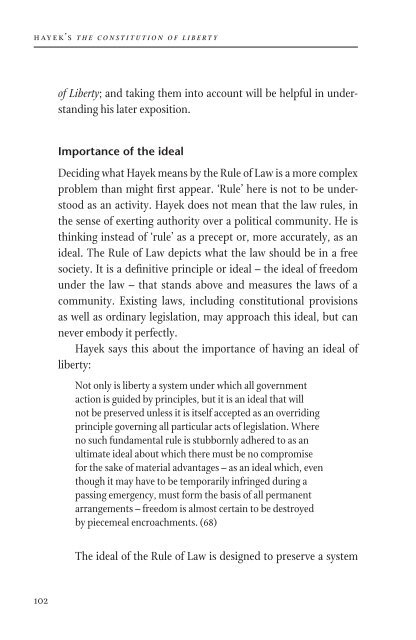Hayek's The Constitution of Liberty - Institute of Economic Affairs
Hayek's The Constitution of Liberty - Institute of Economic Affairs
Hayek's The Constitution of Liberty - Institute of Economic Affairs
You also want an ePaper? Increase the reach of your titles
YUMPU automatically turns print PDFs into web optimized ePapers that Google loves.
h ay e k ’ s t h e c o n s t i t u t i o n o f l i b e r t y<br />
t h e r u l e o f l aw a n d i t s d e t r a c t o r s<br />
<strong>of</strong> <strong>Liberty</strong>; and taking them into account will be helpful in understanding<br />
his later exposition.<br />
Importance <strong>of</strong> the ideal<br />
Deciding what Hayek means by the Rule <strong>of</strong> Law is a more complex<br />
problem than might first appear. ‘Rule’ here is not to be understood<br />
as an activity. Hayek does not mean that the law rules, in<br />
the sense <strong>of</strong> exerting authority over a political community. He is<br />
thinking instead <strong>of</strong> ‘rule’ as a precept or, more accurately, as an<br />
ideal. <strong>The</strong> Rule <strong>of</strong> Law depicts what the law should be in a free<br />
society. It is a definitive principle or ideal – the ideal <strong>of</strong> freedom<br />
under the law – that stands above and measures the laws <strong>of</strong> a<br />
community. Existing laws, including constitutional provisions<br />
as well as ordinary legislation, may approach this ideal, but can<br />
never embody it perfectly.<br />
Hayek says this about the importance <strong>of</strong> having an ideal <strong>of</strong><br />
liberty:<br />
Not only is liberty a system under which all government<br />
action is guided by principles, but it is an ideal that will<br />
not be preserved unless it is itself accepted as an overriding<br />
principle governing all particular acts <strong>of</strong> legislation. Where<br />
no such fundamental rule is stubbornly adhered to as an<br />
ultimate ideal about which there must be no compromise<br />
for the sake <strong>of</strong> material advantages – as an ideal which, even<br />
though it may have to be temporarily infringed during a<br />
passing emergency, must form the basis <strong>of</strong> all permanent<br />
arrangements – freedom is almost certain to be destroyed<br />
by piecemeal encroachments. (68)<br />
<strong>The</strong> ideal <strong>of</strong> the Rule <strong>of</strong> Law is designed to preserve a system<br />
<strong>of</strong> liberty. What remains uncertain, however, is how an ideal as<br />
such, as distinct from some particular ideal, is to be understood.<br />
What is its cognitive status? Is it grounded in what we can know<br />
or experience <strong>of</strong> reality?<br />
A meta-legal principle<br />
In the Cairo Lectures, Hayek describes the Rule <strong>of</strong> Law as ‘an<br />
extra-legal rule’ or ‘a Meta-Legal principle’ (1955: 26, 32–3). Hayek<br />
opens Chapter 14 <strong>of</strong> <strong>The</strong> <strong>Constitution</strong> <strong>of</strong> <strong>Liberty</strong> with a section<br />
entitled ‘<strong>The</strong> rule <strong>of</strong> law [as] a meta-legal doctrine,’ and here he<br />
quotes the third lecture almost verbatim:<br />
<strong>The</strong> rule <strong>of</strong> law is … not a rule <strong>of</strong> the law, but a rule<br />
concerning what the law ought to be, a meta-legal doctrine<br />
or a political ideal. It will be effective only so far as the<br />
legislator feels bound by it. In a democracy this means<br />
that it will not prevail unless it forms part <strong>of</strong> the moral<br />
tradition <strong>of</strong> the community, a common ideal shared and<br />
unquestioningly accepted by the majority. (206)<br />
Hayek intends to draw a sharp line between laws and the Rule<br />
<strong>of</strong> Law: ‘From the fact that the rule <strong>of</strong> law is a limitation upon<br />
all legislation, it follows that it cannot itself be a law in the same<br />
sense as the laws passed by the legislator’ (205). Systems <strong>of</strong> laws<br />
or rules are products <strong>of</strong> the evolutionary process, where man<br />
interacts constantly with his environment. <strong>The</strong> Rule <strong>of</strong> Law as an<br />
ideal or meta-legal principle, while derivative from this process,<br />
somehow stands above it as a constant or universal. It provides a<br />
standard to which the laws should conform, if they are to remain<br />
within bounds. <strong>The</strong> ideal’s political effectiveness will depend on<br />
whether a community believes in it, and this depends in turn<br />
102<br />
103












